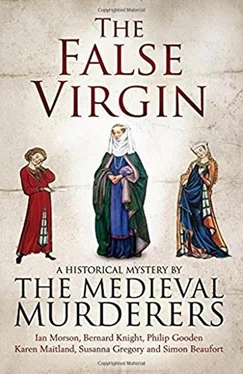Geoffrey waited a few moments. When he passed through the gate, he nodded at the gatemen, who dipped their heads slightly as a mark of deference. Geoffrey was known to them – as the husband of a demoiselle serving Queen Constance and as the brother-in-law to Katherine Swynford – but he was not important enough to merit a proper bow. He stopped and spoke to the sharper-looking of the doormen.
‘Someone came through here a few moments ago, a man wearing a red cap. You know who it was?’
‘I believe his name is John.’
‘It is John Hall, sir,’ said the other doorman. ‘I know him because I know Hugh, his brother, who is in the household. John is often here.’
That explained red-cap’s familiarity with the Savoy. Chaucer thanked them. He said nothing more to the doormen but decided to report John Hall to one of the stewards. Violent and seditious talk against the Duke of Lancaster by one who regularly visited the Savoy could not be tolerated.
Immediately inside the entrance and to the right was a chapel and a library, and beyond lay some of the extensive accommodation for the servants, as well as the stables. The bigger apartments and the state rooms were on the river side of the palace. Geoffrey made his way along passages and up and down stairs and through cloistered spaces towards his wife’s lodgings. As he drew nearer to them, the very fabric of the building seemed to grow lighter and more airy. He arrived at the ornate lobby outside Philippa’s door and was taken aback to encounter a group of men waiting there in sober silence. He recognised one of them, a steward called Thomas Banks. The others were regular members of Gaunt’s retinue.
Geoffrey’s first response was one of alarm. He asked what was wrong and then, when Banks put a finger to his lips as a sign for quiet, asked again more loudly. The steward was prevented from replying by the opening of the door behind him. A long face looked out. A long body followed. At once the gaggle of men drew right back as if they were trying to sink into the rich hangings on the walls while Banks himself bowed deeply. As did Geoffrey Chaucer, for the man who had emerged from Philippa’s chamber was none other than John of Gaunt, the Earl of Richmond and Derby, of Leicester and Lincoln, as well as the Duke of Lancaster and the King of Castile.
‘Geoffrey! How very pleasant it is to see you again. May I entreat you to enter your own wife’s quarters.’
Chaucer was conscious of Gaunt’s retainers looking at him with respect – that warm, almost eager welcome from their master! – perhaps tinged with amusement. Was anything mischievous intended by that remark about his wife’s quarters? Gaunt himself held the door open for Geoffrey to go in. He did it with a touch of mock servility. He was in a good mood. The reason became apparent the moment Geoffrey got inside his wife’s chamber. On the far side of the room, close by the windows overlooking the Thames, stood Gaunt’s mistress, Katherine Swynford. She smiled to see him. Her smile warmed his heart in a way that his wife’s did not, even though the women were sisters.
‘Philippa claims that the view from here is even better than the one from my apartment,’ said Katherine. ‘The Duke of Lancaster decided to see for himself.’
‘You may not believe it, Geoffrey, but there are rooms in the Savoy that I have never entered,’ said John of Gaunt.
Since there were hundreds of rooms in the palace, most of which Gaunt would never dream of visiting, this was hardly news, but Chaucer put on a face suggesting mild surprise. He understood that it might be useful for Katherine and Gaunt occasionally to meet out of the public eye – if you disregarded all those retainers waiting outside. What place more convenient than Philippa’s chamber, at the other end of the palace from the area reserved for Constance of Castile and her party? Gaunt was lately returned with his duchess from Bruges, where he had concluded a peace treaty with the French. He had been parted from Katherine for some time. Not that anything improper had been occurring just now. The two lovers had evidently been chatting and laughing together, like any couple at ease in each other’s company. Gaunt was dressed in a dark blue jupon, sparsely tagged with gold buckles and hangings, quite informal. Katherine was likewise clad in blue, a tight-fitting gown that emphasised her full figure.
‘Where have you come from, Geoffrey? You look as though you’ve walked a distance.’
‘I’ve come from Aldgate, my lord, and before that I was at Bermondsey Priory.’
Gaunt picked up on the priory reference, as Geoffrey perhaps intended he should. He started asking questions, staring hard at Chaucer. An aquiline nose – his father’s legacy – separated penetrating eyes. As always when he was talking to Gaunt, or rather being talked to, he was conscious of the Duke’s height. The questioning continued. What had Chaucer been doing at Bermondsey? Writing. Ah, yes, of course he had been writing. His subject? A poem about a saint. Who? Beornwyn? No, I have not heard of her.
‘That’s because she is known for her virginity,’ said Katherine to John, and gave a small laugh. Her laugh was one of her most attractive features. She added: ‘And St Beornwyn is chiefly known for the fact that her violated body was shrouded by butterflies.’
Gaunt and his mistress were curious now. Geoffrey was encouraged to produce this latest offering, encouraged to distribute the poem, to read it aloud to his friends and admirers at court. Geoffrey put up the tiniest show of reluctance and, secretly delighted, agreed to produce the copies as soon as possible. Then they seemed to remember why he was here in Philippa’s chamber. Katherine said: ‘If you are looking for your wife, Geoffrey, she is walking outside on the terraces. The day is a pleasant one for exercise.’
It was a polite dismissal. Bowing to Gaunt and Katherine, who were now standing side by side, Geoffrey withdrew. The retinue outside the door relaxed when they saw it was only he who was emerging from the room. Geoffrey nodded at the steward, Thomas Banks. As he was threading his way through yet more corridors and cloisters, he remembered that he’d intended to tell someone about John Hall, the man in the Tabard. Yet, inside the Savoy and its vast precincts, the firebrand’s words seemed rather puny. To attempt anything against the palace and its inhabitants would be like kicking against the side of a mountain.
Once outside, he paused to admire the view. Geoffrey knew that Gaunt took a well-informed interest in the Savoy gardens, an interest that accounted for their colour and their order. Rose gardens and borders of flowers were interspersed with orchards, while each end of the terraces was given over to herb and vegetable plantations, together with a couple of well-stocked fish ponds. In between were paths and gently graded steps leading down to the low wall fronting the sweep of the river
There were quite a few people outside, apart from the gardeners, strolling singly or in pairs and small groups. Shading his eyes against the sun, Chaucer glanced about for Philippa, without expecting to see her so soon. Indeed, he nearly missed her because she was in company and not female company either. She walked past almost directly below where he was standing on the topmost terrace, about three levels down. He did not recognise the gentleman deep in conversation with his wife. The man was elegantly dressed but not in the English style. Their heads, when they could be glimpsed through new foliage and branches, were close together. The couple reached a clear space at the end of a walk, turned round and paused before retracing their steps. Chaucer heard Philippa’s laugh, distinct, louder than her sister, Katherine’s. Her companion grasped her by the upper arm. Or perhaps he simply touched her there. Geoffrey couldn’t be sure at this distance. He stood in thought, undecided what to do, before a bell sounding twelve, from one of the newly installed clocks in the palace, brought him back to himself.
Читать дальше












